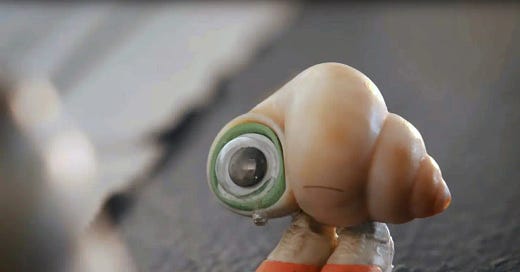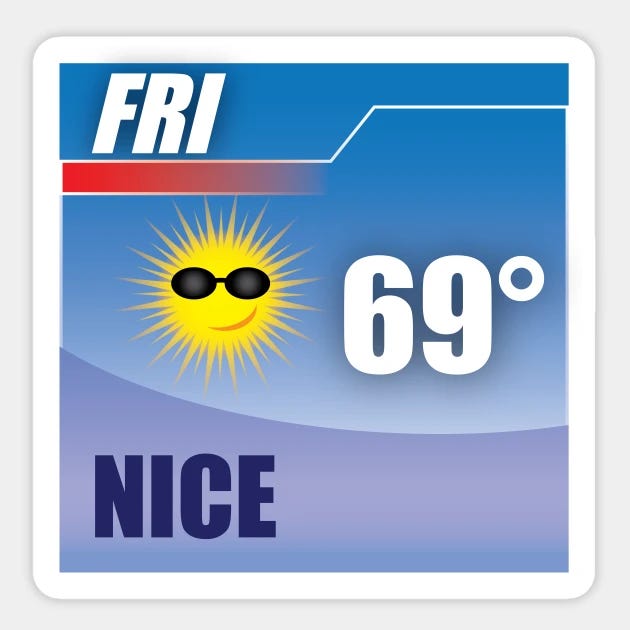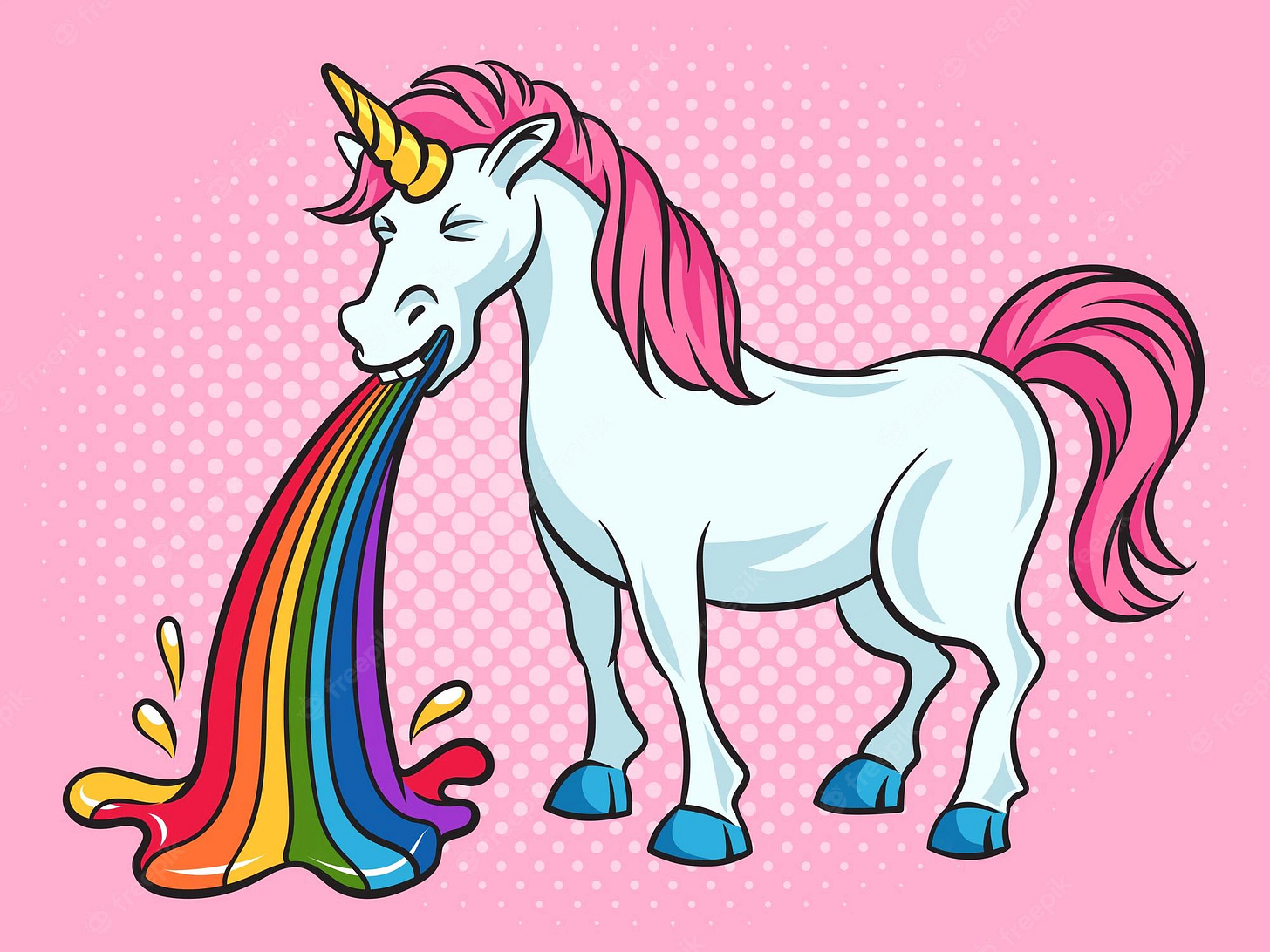'Marcel the Shell with Shoes On': Nicecore done right
Move over, Paddington, there's a new shell-iff in town 🐚🤠
I swear to every deity above my next post will be literally ANYTHING besides a movie review but the cineplex is positively abuzz with life right now and I’ve got *all these thoughts and nowhere else to put ‘em*
The Substack We Need Right Now
What does it mean to be the “[blank] we need right now”? You’ve definitely read this phrase at some point in the past six years, pegged to a movie or song or TV show of some uplifting virtue, an optimistic balm in pessimistic times. Often, the entertainment in question proffers some moral or spiritual guidance. ‘Paddington 2’ says “if you’re kind and polite, the world will be right.” ‘Ted Lasso’ (gently, the gentleness is crucial) asks us to be “curious, not judgmental.” In a world sometimes literally catching on fire, these sorts of huggable, argument-proof messages are — say it with me! — what we need right now.
Broadly speaking, you might call this movement “nicecore,” a term coined by Indiewire critic David Ehrlich back in 2018. At its (nice) core, nicecore stories are:
…humane and optimistic — short on discord, long on warmth, and explicitly about the goodness in people… that subvert the idea that we have to tear each other down to prop ourselves up, or the idea that success is a naturally a zero-sum game.
‘Queer Eye’ is nicecore. ‘The Great British Bake Off’ is nicecore. I suppose ‘The Lord of the Rings: The Rings of Power’ could be considered nicecore, too, though I hesitate to include character-free screensavers in the list.
You will not be surprised to learn I find the whole concept somewhat lacking! In a reality show or kids’ entertainment (which ‘Paddington’, for instance, very much is), sure, go with god; I think there’s room in either, maybe even necessity sometimes, for a kind of easy-going moralism. Where… I guess we’ve got to call it scripted adult nicecore misses me, though, is the way in which that moralism so frequently ignores the realities of the world, or worse serves as a cudgel against criticism. You happen to think ‘Ted Lasso’ is an overrated sitcom that’s about as comedically sharp as a 30-year-old ‘Family Circus’ comic? Well, brother, I know a guy who might be able to help you turn that frown upside-down. And no, his name’s not Jesus Christ.
If I’m going hard on ‘Lasso’’s nuclear positivity it’s not because I disagree with it — we SHOULD be kind to each other, you dipshit — but because it so frequently feels unearned. There’s a Christmas episode in season two so cloying I’ll never forget it as long as I live, the primary conflicts of which are a kid bullying Roy Kent’s niece over her bad breath (I thought this show was about soccer1) and making sure a holiday dinner for London-stuck players has enough tables. Riveting stuff! In the first story, the girl out-nices her bully, convincing him to change his ways; in the latter, would you believe it, they find enough tables. (It is implied this happens due to kindness.) This show has won the Emmy for Best Comedy two years in a row.
I swear we’re getting to the movie, guys
Anyway I damn ‘Lasso’ — a show I watch every episode of the morning it arrives — to praise ‘Marcel the Shell with Shoes On’, which trades the former’s black and white (like on a soccer ball! Theme) moralizing for shades of gray2. It’s as nicecore as anything you could ever possibly see but, and I'm saying this about a movie starring an anthropomorphized talking shell (with shoes on), it doesn't treat you like a GD child.
Let’s rewind to October 2010. ‘The Social Network’ has just MAAARRRRKKKed its way to box office glory, Obama & Co. are weeks away from being handed a sizable midterm election rebuke, and a cute lil’ YouTube video with the viral randomness of I Can Has Cheezburger? and the quirk of an Aardman Animations short is melting America’s heart. Meet, in his digital debut, Marcel.
I can only speak for myself, but it’s the alchemy of joyful, detail-rich animation (c/o director Dean Fleischer-Camp) and Jenny Slate’s first team hall of fame voice work that turns what could have remained some late aughts web curio (see “I Can Has Cheezburger?”) into… dare I say art? Even in 3 minutes, 22 seconds, there’s character here, there’s comedy, there’s pathos. And there’s the sense of a much, much bigger world outside Marcel’s understandably minuscule home.
Twelve years later, Marcel’s feature-length movie of the same name takes that idea and runs with it, giving our friend a grandmother (Isabella Rossellini, beyond perfectly cast), a long-lost family (they were accidentally swept up in a rush cleaning job), and an obsession with Lesley Stahl of ‘60 Minutes’.
This is all, on the surface, impossibly twee; almost concentrated nicecore. That A24 sold — and sold out of! — Marcel action figures does nothing to help this charge. But just like the short, an undercurrent of hard-won sincerity offsets moments that, in someone else’s hands, might have given audiences nice-poisoning.
It’s not going out on a limb to say the reason for this is Slate and director Dean Fleischer-Camp, who recapture all ‘Marcel’s original magic while also credibly building on it.3 But there’s an important offscreen detail that — and now I AM going out on a limb — I think informs the “hard-won” part of the equation, and might be the movie’s real secret weapon.
Divorce, Mollusk Style
Slate and Fleischer-Camp were married from 2012 to 2016. They divorced. She went on to date Captain America, twice, before marrying an artist named Ben Shattuck and relocating part-time to Massachusetts. (This is all internet-searchable! I’m not WEIRD.) There’s less biographical information on Fleischer-Camp because, you know, he’s not Jenny Slate. But it would not be inaccurate to call this movie at least an artistic reunion between exes.
The movie’s not about divorce! But it is about regret, and fear, and the fact there’s no joy without risk. Fleischer-Camp plays himself in the movie — a documentarian also named Fleischer-Camp4 — AirBnBing the house Marcel and Nana Connie live in after a break-up. They've all lost something (Marcel's family; Dean's wife), and they're all trying to get it back, to re-forge connection as best they can. But they're also scared, pre-emptively heartbroken to put themselves out there — especially if it means winding up lonelier than they were before.

So when their respective journeys come to an end and Marcel (Slate) tells Fleischer-Camp (Fleischer-Camp), “you’re always welcome over here”… well, I can’t help but read it as a sweet, earned sentiment between former partners, in multiple senses. Obviously I can’t know how it plays for those of you who for whatever reason might be out of the loop on alt comedy relationship gossip. But I think you can feel it — genuine loss and genuine warmth — regardless.
‘Marcel’ is about striking up the courage to try something new, whether searching for your long-lost family or transforming romantic love into creative collaboration. It’s scary! But you do it anyway, the many ills and challenges of the world notwithstanding. THAT, more than Ted Lasso baking fucking biscuits, is what feels
I mean football
and Millennial pink
Maybe ‘Marcel’s most direct cinematic forebear is actually… ‘Wayne’s World’?
honestly, dude, I would change the last name, and I say this as someone named Henning Barfoed Fog







